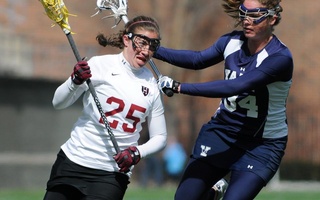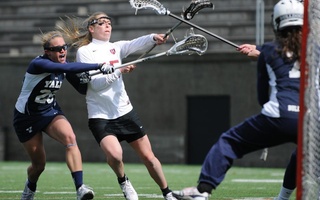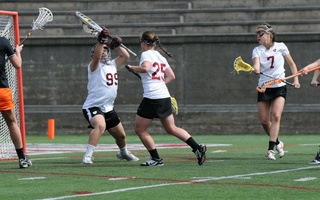Things were not looking up for the Harvard women’s lacrosse team on the night of April 2.
That evening, the University of Virginia handled the Crimson, 12-6, marking Harvard’s second straight loss by at least four goals. The Crimson returned to Cambridge with a record of 4-6 overall and 1-2 in the Ivy League. After entering the season ranked No. 19 in the country, it was clear the Crimson was not exactly living up to expectations.
Even worse for Harvard, another conference loss would almost surely put an end to the squad’s hopes of securing a berth in the four-team Ivy League tournament.
“Dropping that game was the lowest of all lows,” co-captain Melanie Baskind says.
But Harvard managed to turn things around—in a big way. The Crimson won its next five games, including victories over then-No. 18 Princeton and then-No. 10 Dartmouth. After downing its next four Ivy opponents, Harvard grabbed the No. 4 seed in the Ivy tournament, where the Crimson fell in the opening round to first-seeded Penn.
The key to the Crimson’s eventual success was its defense. Harvard (9-7, 5-2 Ivy) closed out the 2012 season by holding each of its last six opponents to under 10 goals, and the Crimson’s 7.81 goals against average to finish the season was good for fifth in the nation.
“I think we had some really talented players on defense,” co-captain Ellen Gleason says. “We also had talented players coming off the bench defensively. We had the opportunity to rotate some people in, and I think that really improved our dynamic.”
Much of Harvard’s defensive success can also be attributed to the addition of rookie goalkeeper Kelly Weis. Weis, who started every game in net for the Crimson, stopped 47.4 percent of the shots she faced, the 14th-best mark in the country.
“She was so instrumental in our success,” says Baskind of Weis, who was an All-Ivy honorable mention.
Gleason also played a crucial role in the Crimson’s defensive success. A senior defender, Gleason started all 16 games and was the Crimson’s lone representative on the All-Ivy First Team.
“We were all so happy and proud of her because she’s someone that doesn’t get recognized all the time for holding it all together back there,” Baskind says. “She was really the main reason why we gave up so few goals this season. We all knew, but now everybody knows.”
While the Crimson’s defense held strong throughout the year, Harvard struggled at times on the offensive end early in the season.
After averaging 12.19 goals per game in 2011, the Crimson failed to score in double figures in five of its first seven games. Harvard had more success finding the back of the net in its nine remaining regular season contests, putting up at least 10 scores on five occasions.
Part of the Crimson’s early troubles could be attributed to a change in style. While Harvard relied on junior attacker Jennifer VanderMeulen—who led the conference in scoring in 2010 and 2011—in each of the past two seasons, the Crimson employed a much more balanced attack in 2012.
VanderMeulen finished third on the Crimson with 26 goals—well below her mark of 48 in 2011—behind junior midfielder Danielle Tetreault (28) and Baskind (27).
Read more in Sports
WOMEN'S SQUASH: Harvard Captures 13th National TitleRecommended Articles
-
 John H. Harbison
John H. Harbison -
 Crimson Takes Down Defenseless Bulldogs with Ease
Crimson Takes Down Defenseless Bulldogs with Ease -
 Late Johns Hopkins Goal Deals Women's Lacrosse 8-7 Loss
Late Johns Hopkins Goal Deals Women's Lacrosse 8-7 Loss -
 Women's Lacrosse Looks To Bounce Back Against Eagles
Women's Lacrosse Looks To Bounce Back Against Eagles -
 FEMALE ROOKIE OF THE YEAR, RUNNER-UP: Kelly Weis
FEMALE ROOKIE OF THE YEAR, RUNNER-UP: Kelly Weis -
Over the 'Cliffe: Women Narrate HarvardThe night before Jean B. Gleason’s final exam in a competitive class, she could not sleep. The phone in her ...













